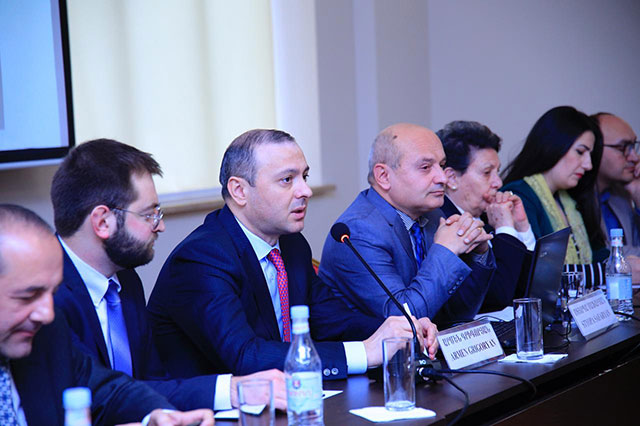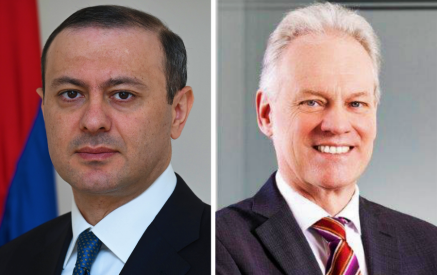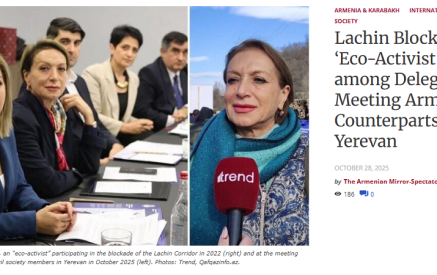On December 23 the XI AIISA Security Forum under the title “Armenia’s security challenges ahead of 2023” was held at the Ani Grand Hotel. The event was attended by graduates and alumni of the AIISA Democracy Schools, associate and partner experts, representatives of embassies accredited to Armenia—advisers, military attaches and diplomats from European and Middle Eastern countries.
After the opening speech Styopa Safaryan, the founder and head of the Armenian Institute of International and Security Affairs, announced the launch of the new programs—”Database, Conflict Charts and Security Risk Assessment“—which AIISA implements within its research project in partnership with the National Endowment for Democracy. The development of the methodology for the new program began in the spring. For this purpose, the AIISA research group studied all similar activities and successful examples in the world and as a result built a model for collecting, processing and analyzing data related to the Artsakh and Armenian-Azerbaijani conflict, the purpose of which is to assess the security environment in our region and conduct a risk assessment based on a scientifically accurate methodology, and, accordingly, calculate the probability of a military escalation.
The database consists of 6 interconnected databases: 1) “Conflict & Response” timeline, it includes all military and hybrid incidents of ceasefire violations occurring on the Artsakh-Azerbaijan contact line or the Armenia-Azerbaijan border; 2) “Foreign policy developments & Response” timeline, it includes the main foreign policy developments of the parties to the conflict and all countries/powers involved in the region, which affect regional security trends; 3) “Security decisions & Response” timeline, it includes the resolutions and normative acts adopted by the parties to the conflict and all the countries/powers and organizations involved in the region, respectively, at the national and international levels, which affect regional security trends, 4) “Economic developments & Response” timeline, it includes the main economic developments of the parties to the conflict and all countries/powers and organizations involved in the region, which affect regional security trends; 5) “Domestic developments & Response” timeline, it includes the main domestic poitical developments of the parties to the conflict and all countries/powers involved in the region, which affect regional security trends, 6) “Societal/public developments & Response” timeline, it includes the main social/humanitarian developments of the parties to the conflict and all the countries/powers involved in the region, which affect regional security trends.
In the second stage, the data collection and charting is followed by indexing of the collected incidents and events according to the best international practices and scientifically based methodologies, the construction and analysis of time series based on them using correlation and event analysis methods. In the last, third stage, a current risk assessment is performed.
Read also
Styopa Safaryan stressed the importance of the program in terms of having a complete and unified database of information about the Armenian-Azerbaijani/the Artsakh conflict, forecasting planned wars and significant military-political escalations, early response to them, planning and designing the negotiation process and risk assessment. The head of the AIISA research program is convinced that thanks to this unique product of the Institute, the academic-research community, the responsible governmental agencies (Ministry of Foreign Affairs, Cabinet of Ministers, Ministry of Defense, etc.) and all potential beneficiaries will have the opportunity to study the escalations of the past more deeply and assess the effectiveness or inefficiency of the response at the national and international levels, identify those catalyzing incidents that significantly affect the situation, and better plan an early response strategy in the future. In this regard, the presentation and findings of the experimental model built for the August-December 2022 time-period are noteworthy, which allowed to establish some correlation between the timelines constructed for Azerbaijan’s aggression against Armenia on September 13 and the military-political crises of Azerbaijan’s closure of the Lachin corridor and the blockade of Artsakh since December 12.
The presentation of the program was followed by a Q&A session with the active involvement of the forum participants.
After presenting the launch of the new AIISA programs, AIISA head Styopa Safaryan and Chairman of the Board of Trustees Anahit Bakhshyan ceremoniously handed over the certificates of participation to the graduates of the 32nd and 37th editions of AIISA’s Democracy School.
During the second session, with the participation of the AIISA associated and partner experts, there was an exchange of views on the crisis caused by the blocking of the Lachin Corridor by Azerbaijan, its goals, the role of Russian peacekeepers in it and the necessary steps to resolve it. AIISA Research Coordinator Ruben Mehrabyan, Orbeli Center expert Johnny Melikyan, Modus Vivendi Center Head Ara Papyan and others made reports, assessments and suggestions.
During the last session of the forum, the participants met with the special guest-speaker, Armen Grigoryan, the Secretary of the Security Council of the Republic of Armenia, under the Chatham House Rule. Mr. Grigoryan presented a brief report on the security environment around Armenia.
In particular, the latest developments concerning the crisis around the Lachin corridor, their cause-and-effect relationships were presented and discussed, as well as the approaches and practical steps of the Armenian authorities aimed at resolving the situation. The Q&A session that followed the presentation also covered numerous conceptual and current issues related to the country’s security systems, including the reform process of the army, domestic and foreign policy, security and defense policy and their priorities.
Press Service of the Armenian Institute of International and Security Affairs (AIISA)























































